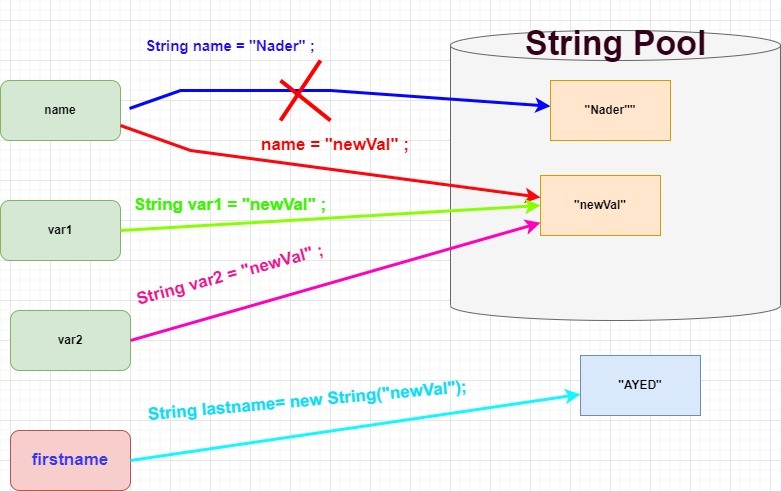What Is Immutable Strings and Exactly How It Works
In the world of shows, understanding the principle of immutable strings is paramount for producing durable and secure applications. Unalterable strings refer to strings that can not be modified after they are developed, ensuring information honesty and predictability within the code.
The Essentials of Unalterable Strings
Immutable strings, as an essential principle in shows, are character series that can not be changed as soon as they are created. This suggests that when a string is assigned a worth, that value can not be altered. In languages like Python and Java, strings are immutable items, resulting in numerous effects in terms of memory management and data stability.
Among the key benefits of immutable strings is that they supply a feeling of safety in data manipulation. Given that the content of an unalterable string can not be modified, it makes sure that the original data stays intact, lowering the danger of unintentional adjustments throughout program implementation (Why are strings immutable in Java?). This property also streamlines debugging processes, as designers can rely on that as soon as a string is specified, its worth will not be inadvertently modified
When a brand-new string is developed based on an existing one, instead than changing the initial string, the brand-new worth is kept independently. Overall, understanding the basics of immutable strings is vital for grasping programs concepts and optimizing code efficiency.
Advantages of Immutable Strings
Building upon the security and performance benefits of unalterable strings, their benefits expand to improving code dependability and simplifying simultaneous programs tasks. By being immutable, strings can not be changed after creation, which eliminates the threat of unplanned adjustments in the information they keep. This integral immutability makes sure that once a string is produced, its worth remains continuous throughout the program's implementation, lowering the chances of insects brought on by unforeseen alterations.
Additionally, immutable strings add to code reliability by making it easier to reason concerning the state of a program. Considering that strings can not be changed, programmers can trust that a string will always hold the very same worth, simplifying debugging and upkeep efforts. This predictability leads to a lot more dependable and stable codebases.

Execution in Programming Languages
Within numerous shows languages, the consolidation of immutable strings is an essential aspect that influences just how data is taken care of and controlled within code structures. The application of unalterable strings differs across various programs languages, with each language supplying its own devices to support this idea.

On the other hand, languages like C and C++ do not have built-in support for immutable strings. Designers in these languages should by hand apply immutability by imposing regulations within their code to avoid straight modifications to string items.
Best Practices for Collaborating With Unalterable Strings
When taking care of immutable strings in programs languages like Java and Python, adhering to ideal methods guarantees effective and safe and secure information control. Among the vital best practices is to make use of StringBuilder or StringBuffer rather than directly controling strings, particularly when managing comprehensive concatenation procedures. These courses give mutable choices for string manipulation, helping to avoid unneeded memory allowances and boosting performance.
One more ideal method is to utilize string interpolation or formatting works given by the language rather of hand-operated concatenation. This not just boosts readability however likewise aids in preventing usual risks such as unintended string modifications. Furthermore, when working with delicate information such as passwords or API tricks, it why not try this out is essential to avoid storing them as simple message in immutable strings. Making use of safe storage mechanisms like char varieties or specialized libraries for dealing with sensitive information aids mitigate security risks connected with unalterable strings.
Real-world Applications and Instances
Checking out useful implementations of unalterable strings in different industries exposes their considerable influence on data honesty and system integrity. In the health care field, unalterable strings play a vital visit this website duty in making sure the protection and confidentiality of individual information. By protecting against unauthorized alterations to delicate information such as clinical documents and prescriptions, immutable strings aid preserve conformity with strict personal privacy regulations like HIPAA.
Banks additionally benefit from the immutable nature of strings to improve the security of client data and deal records. Unalterable strings aid protect against fraud and unapproved alterations to economic info, supplying a robust defense against cyber risks and making sure the trust and self-confidence of clients.

Conclusion
In verdict, unalterable strings are taken care of and unchangeable series of characters that supply benefits such as thread safety and security and enhanced performance in shows. They are executed in numerous shows languages to make certain information integrity and safety and security. Finest techniques for dealing with unalterable strings include avoiding straight alterations and making use of techniques that return brand-new string things. Real-world applications of unalterable strings consist of information file encryption, caching, and string manipulation tasks.
Unalterable strings refer to strings that can not be changed after they are produced, making certain information stability and predictability within the code. When a brand-new string is produced based on an existing one, instead than changing the original string, the brand-new worth is stored individually.In languages like Java and Python, strings are unalterable by default, meaning that as soon as a string things is developed, its worth can not be transformed - Why are strings immutable in official source Java?. Ideal techniques for functioning with unalterable strings include avoiding direct adjustments and utilizing techniques that return brand-new string items. Real-world applications of immutable strings include data security, caching, and string control tasks
Comments on “Why Are Strings Immutable in Java? Thorough Evaluation for Developers”